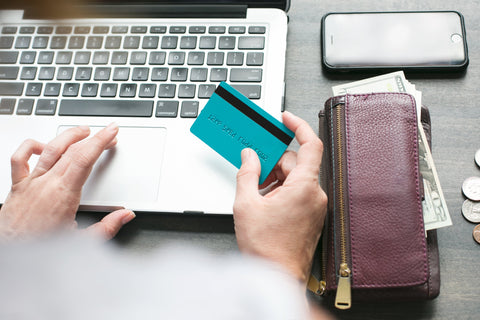Even before the pandemic, I was a big supporter of buying things online, especially through the massive online giant we call Amazon. Now that it’s become unsafe to go shopping in stores, even where cases of the virus have dwindled significantly, people have gravitated to getting their groceries and various other items online. Of course, this has put a significant strain on the shipping industry.
Unfortunately, scammers know this and they’re out to make a buck on the backs of people with nowhere else to turn. That’s why in these days of the “new normal” we all have to be extra vigilant of the online shops we visit and where we’re spending our money, especially when money is becoming tighter these days.
Thankfully, with a little bit of common sense and a few simple to follow tips, being safe online doesn’t have to be difficult or even impossible to do all the time. Sometimes it’s as simple as trusting your gut and remembering the age old wisdom: “If it sounds too good to be true, it probably is.”
Shop Where Ya Know
You’ve been hunting for a bargain on something you’ve been wanting for a while. While browsing one day, you find a really obscure website with a great deal. The website looks pretty sketchy, but the deal is really good. The only downside is you’ll have to wait about three or four months before it arrives. Should you go for it? Definitely not.
Shopping on websites you’ve never heard of and look like they’re badly designed is a sure way to compromise your finances. Many sites that offer extreme discounts on electronics, toys, and clothes can offer incredible discounts on items with the catch that you’ll need to wait a few months for them to arrive. These items likely come from China, and their quality probably won’t be the best when they arrive. Basically, you’ll get what you paid for.
Sticking with the big name retailers like Amazon or eBay as well as the websites of physical stores like Walmart, Target, and or Office Depot is a far safer option. These places are well known and have established themselves as credible places to shop online safely. While you’re shopping, you can rest assured these places have good security on their websites, they’re going to take responsibility for the products they sell, and if you’re shopping at a store’s website you’ll even be able to pick up items you ordered online. Making returns is also easier with established websites versus obscure websites you’ve never shopped with before.
Additionally, these well known stores also allow third party merchants to sell on their website, providing you with more options in case the main website doesn’t have it available. You might have to pay slightly more or pay for shipping, but you’ll have the security of knowing these merchants are monitored closely and have strict rules they need to follow if they want to continue selling on a certain platform.
If They Don’t Need to Know, Don’t Offer It
We live in a world where oversharing is commonplace. We don’t often stop to think about the dangers of sharing our birthdays, pet’s names, favorite things or places, and even when we’re going to be out of town on vacation. The problem is when you provide all of this information online, you’re essentially offering up a bunch of free information to people who could use it to figure out your passwords or pretend to be you.
The same goes for retail websites, and that includes the well-known ones. No website is completely safe, but some are safer than others. When you register online to use a website, it’s best to only offer up the information that is absolutely necessary to register; no more and no less.
If you don’t need to offer up your email, birthday, city, state, etc., don’t offer it. Some websites may want you to fill out these bits of information to complete a profile, but it is usually never necessary. This is a method of data collecting that some companies may potentially sell to marketers. Worse yet, if the website is ever hacked or experiences a cyber attack, your information could be compromised and now some digital stranger knows a lot about you.
The Stronger the Password, The Better
Most people use the same password for a bunch of different websites. In terms of online security, that’s probably one of the worst mistakes you can make when trying to stay safe online. Everytime you make an account on a website, you really should make a new password that is significantly different from the ones used on other websites and is strong.
But what is a strong password? Strong passwords are ones that contain letters in both uppercase and lowercase, numbers, symbols, and aren’t words or phrases found in the dictionary. Your passwords should look garbled and incomprehensible if anyone saw them. Unfortunately, that would make them virtually impossible for you to remember, especially if you’re making several of them on different websites.
This is where password managers are important. Password managers like LastPass will save all of your passwords in a centralized location and will auto populate them for you when you need to login to websites. If you’d like, you can even set a master password as an extra level of security.
With most password managers, it’s important you never forget your login information to the manager website. In the event you forget it, password managers like LastPass will delete all of the logins you’ve submitted so that anyone pretending to be you won’t be able to get them.
Avoid using commonly used passwords. They’re the first methods hackers or thieves will use to access your accounts. Combined with the personal information you provided on places like social media, they have more than enough information to use to try and crack your passwords. So, don’t overshare and don’t make simple passwords if you’re shopping online.
The Safest Wi-Fi is Private Wi-Fi
When we’re out and about in public places, we often look for hotspots to save data on our phone or to get better connections where data signals might be poor. These public hotspots are a great way to save your data if you’re nearly out and save you a few bucks on overages if you don’t have an unlimited plan.
The problem with public wifi spots is they provide a false sense of security for many people. People sit down at a cafe, bar, or restaurant, access the public wifi, and then browse websites while they enjoy themselves. While this is completely fine if you’re only reading news articles or doing a little research, visiting your social media profiles and shopping online is definitely not advisable.
These public Wi-Fi hotspots aren’t as secure as your own home network. Since the network is public, any thieves on the same network can easily access your data. This is why some websites will if you’re visiting their site from home or in a public place. There is no deal so good that’s worth compromising your privacy and security by shopping in a public place. Just wait until you get home.
If There’s an App for That, Use it
It seems like everyday, another business comes out with their own app for iPhones and Androids. These apps come in handy if you frequently order from one particular place. Apps make shopping more convenient and are considered fairly secure.
By using your phone over a browser, you can essentially control where and when you login to certain merchant websites. Phones like Apple’s iPhones allow users to use their thumbprint as a way to login to places like their bank, avoiding the need to type in a username and password.
Apps also offer certain features you might not get while using a browser based website such as easy ordering of items you frequently purchase, reviewing your order history, a personal price scanner, and even self-checkout if you’re shopping in a store.
It’s important to remember, however, that there is no such thing as a completely secure app. Reputable companies spend hundreds of thousands of dollars to make sure their websites and their applications are as secure as possible, but there will always be a level of risk.
Play It Safe with a Reloadable Debit Card
Debit cards are a great way to manage your money and stick to a budget. They’re also a great way to keep your bank issued debit cards more safe and secure by not having to use them for online purchases.
Reloadable debit cards work the same way as your bank issued card, except they’re not tied to a bank. They don’t offer as many protections as your bank card does, however. But because they’re not tied to your main bank account, should something happen during a transaction with a merchant, you won’t have to worry about your personal bank account being affected.
There are many reloadable debit cards to choose from and most of them have their transactions processed by either Visa or Mastercard. Treat them as you would any debit card. Just because they aren’t tied to a bank, doesn’t mean you should throw caution to the wind with your own money.
Check Your Statements
It should go without saying, but some people get their bank statements in the mail and don’t give them a second thought. I admit to being one of those people, but I do have my bank’s online banking app on my phone so I’m not completely oblivious to my spending history.
When you get checking or credit statements in the mail, it’s always best to take a few minutes and go through all the expenditures to make sure you recognize everything. If you see something you’re not completely sure about, call up your bank or your card issuer immediately.
Make sure to also check the balances and transactions on your reloadable debit cards. Historically, reloadable debit cards didn’t have the same kinds of basic protections banks gave to their own debit cards. But in 2016, new consumer protection laws protected reloadable debit card users from fraud, allowed them to recover money, and protected them from costly fees.
The bottom line: a little bit of common sense will save you a ton of cents. Avoid using your debit card on websites that look sketchy, use a reloadable debit card for added protection, don’t overshare your information on merchant websites or social media, and listen to your gut if a deal sounds too good to be true. And if you do everything right and something still happens, make sure you fight for what you’re out and never consider a single penny a lost cause if a merchant does wrong. Remember that even when being completely safe online, security breaches can and still do happen from time to time. No app will ever be completely secure from a determined digital thief.




Comments (0)
There are no comments for this article. Be the first one to leave a message!